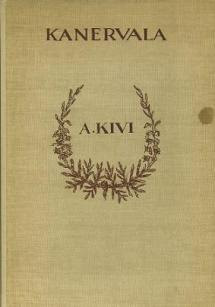Aleksis Kivi was the first professional and well known writer in Finnish. Along with Mikael Agricola and Elias Lönnrot, he is regarded as a father of national literature in Finnish. In his plays, his poems and his novel Seitsemän veljestä (English title: Seven Brothers), Kivi depicts Finland and its women and men in a way that continues to provide a foundation for the national identity of the Finns.

Born in 1834, The careers of his seafaring grandfather and robber great-uncle provided subjects and colour for Kivi's literary imagination. Annastiina Hamberg - an industrious person, the mother of a flock of children and a busy caterer to village banquets - is the prototype of many of Kivi's bustling female characters. It was also through his mother that early in his childhood Kivi came into contact with local Pietists, whose leader was the minister Juhana Bergh.
Kivi became famous and ventured into writing when he won a competition held by the Finnish Literature Society (Suomalaisen Kirjallisuuden Seura; SKS) with a play submitted under his nom de plume and entitled Kullervo; the prize money had been donated by a wealthy merchant named Kiseleff. He worked on his play Aino, a new version of Kullervo and the play Nummisuutarit ('The Heath Cobblers') in 1861 - 63.
In 1866, during his period in Siuntio, Kivi published his plays Karkurit ('The Escapees'), Kihlaus ('The Betrothal') and Olviretki Schleusingenissä ('Beer Outing at Schleusingen') and, at his own expense, the poetry collection Kanervala. The following year saw the publication of the plays Leo ja Liina ('Leo and Liina'), Yö ja päivä ('Night and Day'), Sankarteos ('Heroic Deed'), Lea and Canzio.
Kanervala is the only known anthology of poetry by Aleksis Kivi.
The poems of Aleksis Kivi were long considered no more than a peripheral aspect of his work. They were, as Kivi’s friend Kaarlo Bergbom wrote in a review, ‘gold that can’t be minted into coins’. The reason appears to have been Kivi’s poetic technique, which made a clear break with tradition. He did away almost completely with rhyme and instead emphasised the rhythm and musical sound qualities of words. He shortened words in a way that did not find favour with any subsequent Finnish poets. He avoided emotional expressions of patriotism and romantic love poetry; instead, he composed poems that were extended, narrative and fresco-like.
Lauri Viljanen, whose 1953 study brought about a re-evaluation of Kivi’s poetry, has given them the apt soubriquet ‘epic idyll’.
The first of Kivi’s poems appeared in the Kirjallinen Kuukauslehti (‘Literary monthly magazine’) in 1866; a collection of his poetry entitled Kanervala was published the same year. Other poems appear in his novels and plays, and some have appeared in a collection after his death. Karhunpyynti (‘The bear hunt’) is from Kanervala. Its descriptive nature is typical of Kivi. The verse structure is tightly controlled but unrhyming. The winter landscape of the third verse, repeated at the end of the poem, is a ceremonious point of rest among the otherwise busy activity.
The Bear Hunt
The men on skis set out for the forest, a brave company
With guns and bright spears
And clamouring dogs on the leash,
With blazing eyes,
As the dawn chases gloomy Night
From the sky’s brow,
And the sun raises his head.




No comments:
Post a Comment